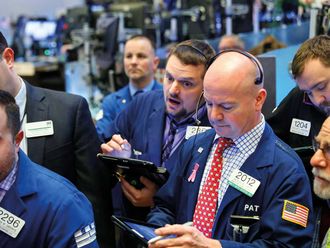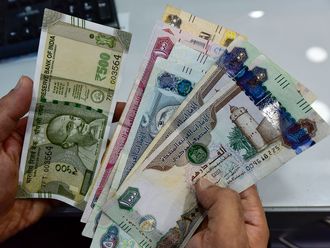London: London hedge fund GAM UK Ltd didn’t want to touch Egyptian debt during the years of political upheaval that followed the Arab Spring.
Now, GAM money manager Denise Prime is among European investors making their way back.
Since Egypt floated its pound this month, the currency’s 44 per cent tumble has virtually eliminated exchange-rate risk, luring Prime and others to short-term domestic debt that yields as much as 19 per cent. That could help unleash a windfall for the government if it recaptures the $10 billion (Dh36.7 billion) that fled the local bond market in the aftermath of the 2011 uprising, leaving only about $50 million as of July.
“We would look at other auctions to build a position,” Prime said after making her first investment in Egypt last week since 2008. She bought Treasury bills on the secondary market for a $5.4 billion fund that invests in local-currency debt across the developing world.
Renewed interest for domestic debt signals money managers abroad are more confident that Egypt’s military leaders will take the steps needed to tackle an economic crisis after five years of turmoil, including the ouster of two presidents, left them struggling to keep the country afloat. Aberdeen Asset Management Plc and Ashmore Group Plc also have Egypt back on their radar after the nation won an unprecedented $12 billion International Monetary Fund aid package.
At an auction on Sunday, investors placed the most bids in more than a year for 12-month debt, helping the government reduce yields to 18.90 per cent, compared with 20.52 per cent in the first sale after the flotation. Egyptian debt has become even more appealing to buy after the central bank raised interest rates by 300 basis points in the wake of the devaluation to stem outflows and control inflation.
“For bond investors it’s beautiful,” said Jan Dehn, head of research at London-based Ashmore Group Plc said in an interview Friday, the day the IMF approved a lifeline that became possible after the central bank floated the pound on November 3. Ashmore plans to invest in Treasury bills, Dehn said.
Not all investors are ready to throw their weight behind an IMF-led resurgence for Egyptian bonds. Thin, illiquid markets may continue to daunt some, according to Bryan Carter at BNP Paribas Investment Partners in London.
“Post-revolution, many investors found themselves unable to liquidate Egyptian pound-denominated assets,” said Carter, who helps oversee $1.3 billion in assets as BNP Paribas Investment’s head of emerging-markets fixed income. “That experience will keep many investors out.”
Others have started trickling back. The Egyptian currency stabilised after losing half its value in the first three days of the flotation. The pound, the worst performer worldwide this year, strengthened 7.7 per cent on Monday to 15.5458 per dollar. Foreign investors have also been net buyers of the nation’s stocks this month.
Seizing on investor interest, Egyptian Finance Minister Amr Al Garhy said last week the country may test the Eurobond market to raise $2.5 billion at the end of November. The 2017-18 budget envisions selling longer-maturity government debt to attract foreign investors, according to the plan released last week.
Aberdeen money manager Kevin Daly, who’s avoided Egypt since 2012, was tempted back last week. Like Prime, he bought T-bills on the secondary market.
“This is a story which potentially should improve,” said Daly, who helps oversee about $10 billion of emerging-market debt from London. “You had a huge foreign-exchange adjustment, rates have gone up and now you have IMF money coming in. Country risk is heading in the right direction.”












